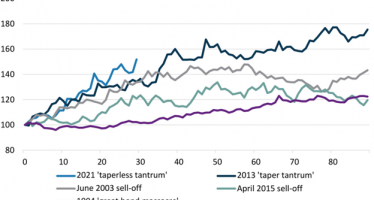Looking for an Easy Fix: The Great Banking Crisis Five Years Later
 Greed, malfeasance, incompetence and a lack of both regulation and oversight brought the world perilously close to a financial Armageddon when Lehman Brothers investment bank collapsed five years ago this week. The tumultuous event left a gaping hole of well over $610bn and precipitated a worldwide financial calamity which still reverberates. In the wake of the Lehman crash, scores of banks and even entire countries tumbled and fell.
Greed, malfeasance, incompetence and a lack of both regulation and oversight brought the world perilously close to a financial Armageddon when Lehman Brothers investment bank collapsed five years ago this week. The tumultuous event left a gaping hole of well over $610bn and precipitated a worldwide financial calamity which still reverberates. In the wake of the Lehman crash, scores of banks and even entire countries tumbled and fell.
For the past five years the origins and causes of the crisis have been exhaustively analysed and discussed. In the US, Europe and elsewhere, regulations were tightened a bit with a view to avoiding a future meltdown.
However, the perception is that the bungling (investment) bankers got away almost scot-free and in many instances even kept claiming their exceedingly fat pay checks and bonuses. Yet these inept financiers and their creative accounting techniques ultimately caused untold millions to lose their jobs or suffer from severely decreased living standards.
In the US, the Justice Department has filed criminal charges against but a handful of bankers and secured only a few convictions. In Britain, not a single banker was put in the dock even though the country had to bail out three of its largest banks and while doing so uncovered a conspiracy that had been rigging Libor, the benchmark interbank lending rate. In all fairness, the Serious Fraud Office did recently charge a few traders for Libor manipulation but so far has left their bosses in peace. Also, Royal Bank of Scotland CEO Fred Goodwin was stripped of his knighthood.
“Yet these inept financiers and their creative accounting techniques ultimately caused untold millions to lose their jobs or suffer from severely decreased living standards.”
Compare this to the Savings & Loan crisis of the 1980s in the US which resulted in over a thousand bankers being convicted for their wrongdoings. Part of the problem faced by prosecutors is that running a company into the ground is not actually a criminal offense. Also, it has proved hard to link misbehaviour on the trading floor to the powers-that-be in the top-floor corner offices. Whilst it may be true that some investment bankers instilled a mentality of excessive risk taking, a smoking gun – such as a clear instruction to defraud investors – is seldom if ever found.
However, misdeeds left unpunished encourage more of the same. In London’s City a new acronym has now cropped up: BAB – Bonuses Are Back. And, indeed, five years after the crash it’s business as usual.
Former chairman of the now defunct Financial Services Authority Lord Turner warned last week that “as long as people expect to make money out of nothing, it will happen again.” This is precisely what some people expect. The strengthening of banking regulation has failed to address the underlying issue of the sector’s penchant for “socially useless” endeavours such as the creation of exotic financial instruments whose complexity merely seeks to mask or spread otherwise excessive risk levels.
Former City Minister Lord Myners sees the regulatory changes as largely cosmetic and quite modest: “Banks are still too big, too interconnected and too undercapitalised.” Lord Myners emphasized that the capital ratio of 3% currently imposed on UK banks is still very thin and sets the stage for future failures.
Some bankers are, however, seeing the light. Douglas Flint, chairperson of HSBC, caused no small measure of surprise with his frank analysis of the industry’s state of mind. On the regulatory reforms Mr Flint said: “The focus has been on capital requirements because that is a parameter we can measure. However, culture is the real issue.”
That culture – of greed unbound – has not changed since the crisis hit. In fact, things may have gotten even worse. In first five months of 2013, some £14bn was paid out by UK banks and insurance companies for bonuses. In the entire year preceding the financial crash, bonuses of about £20bn were disbursed to the chosen few.
Most of the proposals made by the Independent Commission on Banking (ICB), set up in the aftermath of the 2008 crisis, have yet to be implemented. In its report, published two years ago, the ICB strongly recommends regulation be put in place to separate retail banking from its much more risky wholesale and investment cousins. The commission also suggested capital ratios for ring-fenced banks to hover around 17%.
The ICB suggests nothing more than a return to the relatively calm era of the US Glass-Steagall Reforms introduced during the Great Depression in 1933. This – at the time ground-breaking – piece of legislation mandated a strict and total separation between retail banks and investment banks. The act was repealed in 1999 at the urging of investment bankers who coveted the cheap money deposited in high street banks to raise the stakes of their gambling to new heights.
In the years following the Great Depression, most countries adopted their own versions of the Glass-Steagall Act and indeed in the late 1990s again followed the US in scrapping the legislation.
Though experts may offer more nuanced views and attach a plethora of buts and ifs to their analysis of the financial crisis, its causes and its remedies, seldom a problem´s initial fix was easier to pinpoint than this one: Stop gambling bankers from having access to people’s savings.
You may have an interest in also reading…
European Investment Bank: “Vienna Initiative” Keeps Credit Flowing
International financial institutions have joined forces to help calm economic turbulence and avert a collapse in the provision of credit
What Really Spurred the Great Recession?
Based on the research of Ravi Jagannathan, Mudit Kapoor and Ernst Schaumburg Globalization and the U.S. dollar are as much
A Possible Tug-of-war Between the Fed and the Markets
The projections for United States GDP released by the Federal Reserve on March 17, pointed to a growth rate of
















































































